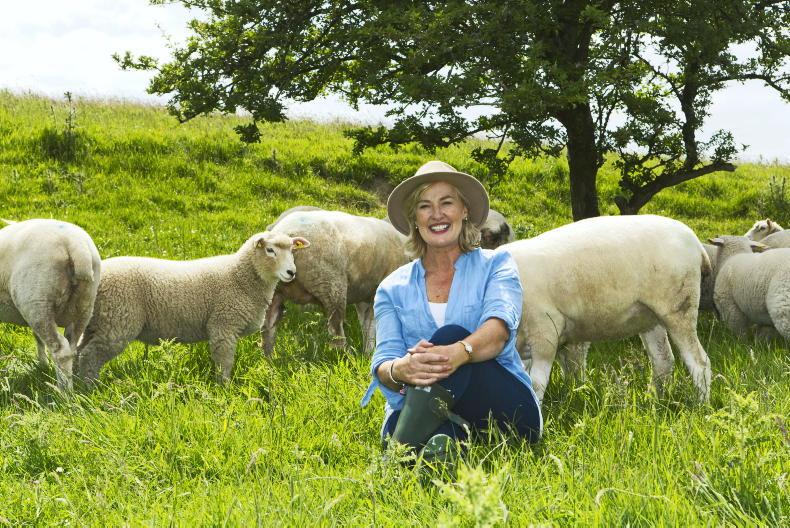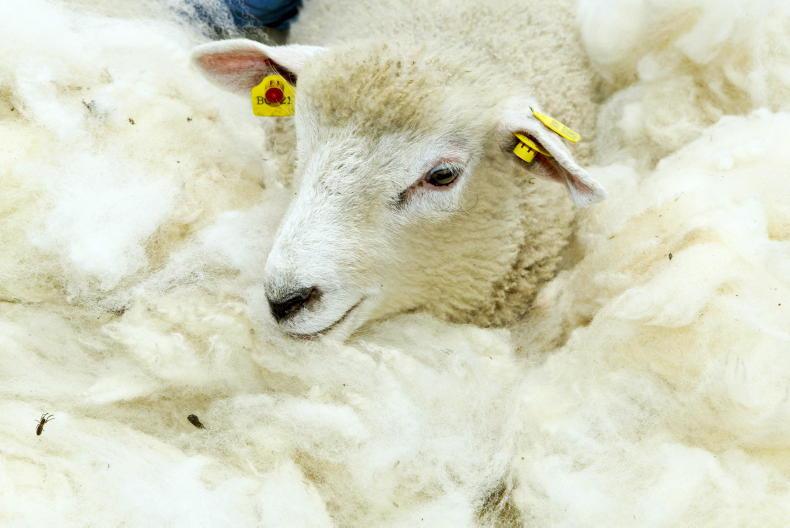Sheep farmers from around the country are receiving up to €2.50/kg for Galway sheep’s wool sold through the Galway Wool Co-op.
Blatnaid Gallagher is one of the co-op founders, set up in 2020 during the COVID-19 pandemic.
“Sheep farmers were getting 20c/kg for wool and we felt that was unjustified when we had wool from a rare Irish heritage breed. Yarn from this breed was once the cornerstone of a now thriving Irish woollen sector,” she said.
Gallagher said that the wool co-op sets the price and has buyers at the €2.50/kg price tag, including the Irish Fibre Crafters, Donegal Yarns, Caoirigh Wool, a woollen mill in Texas, USA, and the Galway Artisans Collective, led by Michelle Hickey, artist in residence to the Galway Wool Co-op.
Each year, clean rolled fleeces from the breed are drawn from all over Ireland to the annual Galway Wool Meitheal at Athenry Mart, with around 5,000kg of clean wool harvested.
The wool is inspected and weighed and each farmer is issued with a receipt for their wool. This work is all done voluntarily, with the co-op members working together to renew a direct route to market for native Irish Galway wool.

A prizewinning sheep at the Galway sheep sale.
It’s also an opportunity to showcase what can be produced from the wool. For two years running, the harvest has run alongside a stunning art exhibition using Galway wool as the medium, Gallagher said.
Native breed
The Galway sheep is the only native Irish sheep breed recognised by the State and is the only sheep eligible for the rare breed action in the Agri-Climate Rural Environment Scheme (ACRES).
“There are a few different Irish sheep breeds, but none are officially recognised as our native sheep breed – a testament to over 102 years of record keeping and administration by the Galway Sheep Breeders Association. At one stage, it was considered endangered and was at risk of extinction.
“The breed is in all four provinces of Ireland - we have breeders in Donegal, Wexford, Kilkenny and west Cork,” she said, adding that it is not a breed confined to the county of Galway. The UK has its own Galway breeders association.
The sheep is a hardy breed. “It’s a dual-purpose breed. The meat is highly succulent and well-marbled. We've had it in Ballymaloe and Galway restaurant Aniar. We produce about 800 carcases per annum,” she said, adding that there are more alpacas in Ireland at the minute than Galway sheep.

Blatnaid Gallagher farms in Aughrim, Co Galway. \ David Ruffles
The co-op was set up with the aim of reestablishing the cultural integrity of Irish wool, restoring a route to market for the product and giving fair prices to farmers.
“We weren’t waiting on the pope or a minister to come and help us,” she said, noting that she spends up to 20 hours a week voluntarily working on the co-op.
The Irish woollen industry is worth €100m per annum in tweed, blankets, knitwear and yarns.
“Irish wool has an international reputation and farmers aren’t getting anything for it,” she said.
In January 2025, the co-op will start a new endeavour and will produce its own yarn. The co-op already has buyers for it, with one woman in Co Clare processing 400kg of it and 200kg will be shipped to a buyer in the US.
Sheep farmers from around the country are receiving up to €2.50/kg for Galway sheep’s wool sold through the Galway Wool Co-op.
Blatnaid Gallagher is one of the co-op founders, set up in 2020 during the COVID-19 pandemic.
“Sheep farmers were getting 20c/kg for wool and we felt that was unjustified when we had wool from a rare Irish heritage breed. Yarn from this breed was once the cornerstone of a now thriving Irish woollen sector,” she said.
Gallagher said that the wool co-op sets the price and has buyers at the €2.50/kg price tag, including the Irish Fibre Crafters, Donegal Yarns, Caoirigh Wool, a woollen mill in Texas, USA, and the Galway Artisans Collective, led by Michelle Hickey, artist in residence to the Galway Wool Co-op.
Each year, clean rolled fleeces from the breed are drawn from all over Ireland to the annual Galway Wool Meitheal at Athenry Mart, with around 5,000kg of clean wool harvested.
The wool is inspected and weighed and each farmer is issued with a receipt for their wool. This work is all done voluntarily, with the co-op members working together to renew a direct route to market for native Irish Galway wool.

A prizewinning sheep at the Galway sheep sale.
It’s also an opportunity to showcase what can be produced from the wool. For two years running, the harvest has run alongside a stunning art exhibition using Galway wool as the medium, Gallagher said.
Native breed
The Galway sheep is the only native Irish sheep breed recognised by the State and is the only sheep eligible for the rare breed action in the Agri-Climate Rural Environment Scheme (ACRES).
“There are a few different Irish sheep breeds, but none are officially recognised as our native sheep breed – a testament to over 102 years of record keeping and administration by the Galway Sheep Breeders Association. At one stage, it was considered endangered and was at risk of extinction.
“The breed is in all four provinces of Ireland - we have breeders in Donegal, Wexford, Kilkenny and west Cork,” she said, adding that it is not a breed confined to the county of Galway. The UK has its own Galway breeders association.
The sheep is a hardy breed. “It’s a dual-purpose breed. The meat is highly succulent and well-marbled. We've had it in Ballymaloe and Galway restaurant Aniar. We produce about 800 carcases per annum,” she said, adding that there are more alpacas in Ireland at the minute than Galway sheep.

Blatnaid Gallagher farms in Aughrim, Co Galway. \ David Ruffles
The co-op was set up with the aim of reestablishing the cultural integrity of Irish wool, restoring a route to market for the product and giving fair prices to farmers.
“We weren’t waiting on the pope or a minister to come and help us,” she said, noting that she spends up to 20 hours a week voluntarily working on the co-op.
The Irish woollen industry is worth €100m per annum in tweed, blankets, knitwear and yarns.
“Irish wool has an international reputation and farmers aren’t getting anything for it,” she said.
In January 2025, the co-op will start a new endeavour and will produce its own yarn. The co-op already has buyers for it, with one woman in Co Clare processing 400kg of it and 200kg will be shipped to a buyer in the US.








 This is a subscriber-only article
This is a subscriber-only article










SHARING OPTIONS: